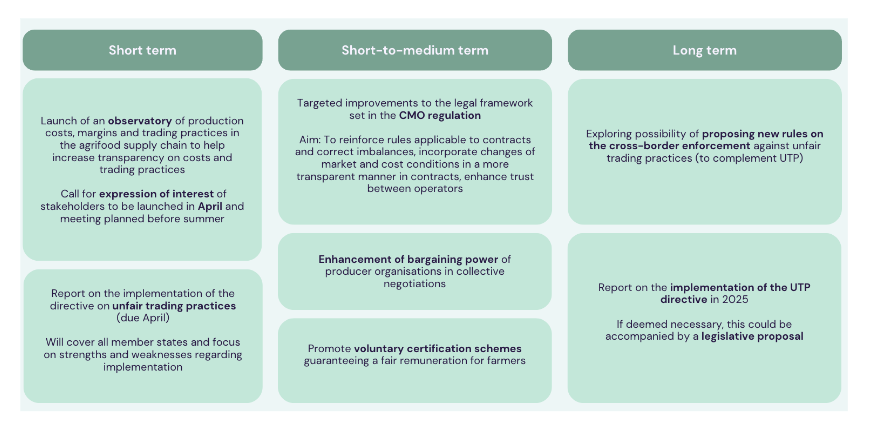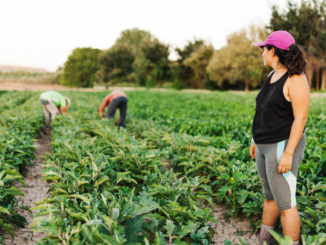
The European Commission has officially put forward plans to slash environmental measures in the EU’s farming subsidy programme and offer up more power to member states in deciding the future course of the policy. Natasha Foote reports.
The plans, initially leaked by ARC on the Wednesday 13th, were published on Friday (15 March). The stated aim of the Commission proposal is lightening the administrative load on farmers amid continuing protests against what is seen by protestors as excessive regulation, unfair pricing and trade competition.
The proposal paves the way for a reopening of the legal acts of the EU’s farming subsidy programme, the Common Agricultural Policy (CAP), which would see mandatory environmental requirements downgraded to voluntary (see chart). The current CAP period began in 2023 and runs until 2027.
Most significantly, the proposal shifts the power balance in favour of member states, granting them greater power to allow exemptions to green measures.
It also proposes an exemption for all farms below 10 ha from any conditionality rule or controls.
The move flies in the face of dire warnings from the European Environment Agency (EEA), which published a first-of-its-kind EU climate risk assessment in the same week as the announcement in which it warns that without urgent and decisive action the risks could become “catastrophic”.
The decision has sparked outcry among green campaigners, who lambasted both the decision and the lack of an adequate consultation process leading up to it.
“It is staggering that in the very same week scientists warn that Europe is unprepared for rapidly growing climate risks, the European Commission – without any impact assessment or proper public consultation – axes the requirement for EU countries to implement the few measures left in the CAP that are designed to build farm resilience in the face of the environmental and climate crises,” Faustine Bas-Defossez, Director for Nature, Health and Environment at the European Environmental Bureau (EEB) said.
For the umbrella organisation, which is itself made up of 180 member organisations drawn from 40 countries, the decision brings into question the “social acceptability and legitimacy of the CAP,” voicing particular concern over proposed changes to procedure for CAP Strategic Plans.
Under the proposal, member states will now be able to amend these plans twice a year with more flexible rules and less scrutiny from the Commission.

‘Ad-hoc consultation’
Based on calculations from 2019 data, the weakening of GAEC 8 alone could see the loss of up to 9 million pesticide-free hectares.
However, no impact assessment was carried out before the presentation of this proposal, which is put down to the “political urgency” of tabling this proposal given the “crisis” situation in the sector. No details are offered on what constitutes a crisis.
Instead, the Commission’s proposal was based on an “ad-hoc consultation process” that lasted one week, as well as written correspondence with four main EU-level farming organisations asking them for proposals of measures.
This has left many civil society organisations questioning the legitimacy of the process, calling on the EU court of auditors to step in and assess the decision making process.
Contacted by ARC, a representative for the EU court of auditors said that it is “likely” that the legislative changes proposed now will be “to some extent included in the special report we are currently working on”.
The report focuses on whether the new 2023-2027 CAP Strategic Plans are sufficiently developed to meet the EU climate and environmental objectives, and is currently pencilled for this summer.
The representative explained that such opinions can only be requested by other institutions – i.e. Commission, Parliament, Council.
While they do not conduct audits at the request of third parties, the auditors “do take the wishes expressed by our key stakeholders into account for planning our future audit work,” the representative added.
Read/Download CAP Regulation (EU) 2021/2115
The Commission’s published proposal as of 15/03/24 COM(2024)139_0
Farmers’ reactions
EU farmers’ association Copa and Cogeca welcomed the steps to revise elements which they consider “too rigid, complex, and overly administrative, maintaining that the current proposition does not call into question “the direction of the agricultural transitions envisioned in the CAP”.
The lobby group points out that the changes to GAECs 5, 6 and 7 do not remove the obligations to comply with these standards, but offer member states and farmers a more “flexible manner of attaining them” considering the local extreme weather events and soil conditions.
IFOAM EU however, representing organic farmers, described the Commission’s “simplification without vision” and a move that would encourage a member state “environmental race to the bottom”. Small farmers group European Coordination Via Campesina criticised the steps proposed to weaken the CAP, maintaining it will “only accelerate the industrialisation of agriculture and its negative impact on farmers, society and the countryside”.
“The simplification measures that are needed must be adapted to support small- and medium-scale farmers and must not drive an increasingly industrialised model,” it said.
Instead, the group impressed the need to strengthen the farmers’ position in the food chain and ensure an adequate remuneration.
The Commission has also sent a separate ‘reflection paper’ to lawmakers in both the Council and the Parliament with short and medium term measures aimed at addressing the farmers’ position in the food chain.
This includes a review of the Unfair Trading Practices law and the creation of an observatory that includes production costs, margins and business practices in the agri-food supply chain – see the chart below for details of what the Commission is considering.
These actions do not represent a proposal from the Commission, but rather exploratory ideas to be further developed in cooperation with the Council.
But these do not go far enough for the small farmers’ group, who maintain that the proposals currently under discussion “do not adequately address the underlying and root causes that have led farmers to take to the streets”.
 Latest from lawmakers
Latest from lawmakers
The two proposals were largely welcomed by member states, according to sources, who added that EU countries widely stressed the need for speed.
This is especially true for the Belgians – who currently hold the reins of the rotating EU presidency – who are keen to adopt the proposal as it is, without amendments, to make it possible to be adopted during this term, the source added.
However, some member states mentioned they would have welcomed other changes as well, for instance regarding GAEC standard 2 on the protection of wetlands and peatlands, while several delegations asked the Commission for clarifications on the content of the text.
Both the proposed observatory and the overarching goal of improving the position of farmers and ensuring transparency was widely welcomed.
Meanwhile, over in the Parliament, discussions are underway between the group AGRI coordinators on whether to endorse the urgent procedure needed to move forward with the re-opening of the CAP.
“Considering the importance of those changes and the limited time ahead of the electoral break, the urgent procedure must be discussed among the Coordinators, may they wish to conclude this file before the last plenary session in April 2024,” a note from the AGRI coordinators, seen by ARC, reads.
While those in the centre-right and right are keen to push ahead with the proposal, there is staunch pushback from the Greens and the Left of the Parliament. Coordinators have until Thursday afternoon to raise objections.
Next steps
If the Parliament gives the greenlight on the urgent procedure, a further meeting is foreseen later this week with the Commission to answer any further questions, according to sources.
Member states would have to inform the Presidency if they cannot support the proposal by the end of this week. If there is support from both sides of the coin, another technical meeting will be held before the next meeting of EU agriculture ministers on 26 March to endorse the proposal.
Meanwhile, the reflection paper on the farmers position in the food chain will also be discussed by ministers at next week’s meeting.
More
Don’t Dismantle CAP’s Green Rules say 330 European Organisations
The Re-Opening of CAP’s Black Box Could Be Coming – And Soon





